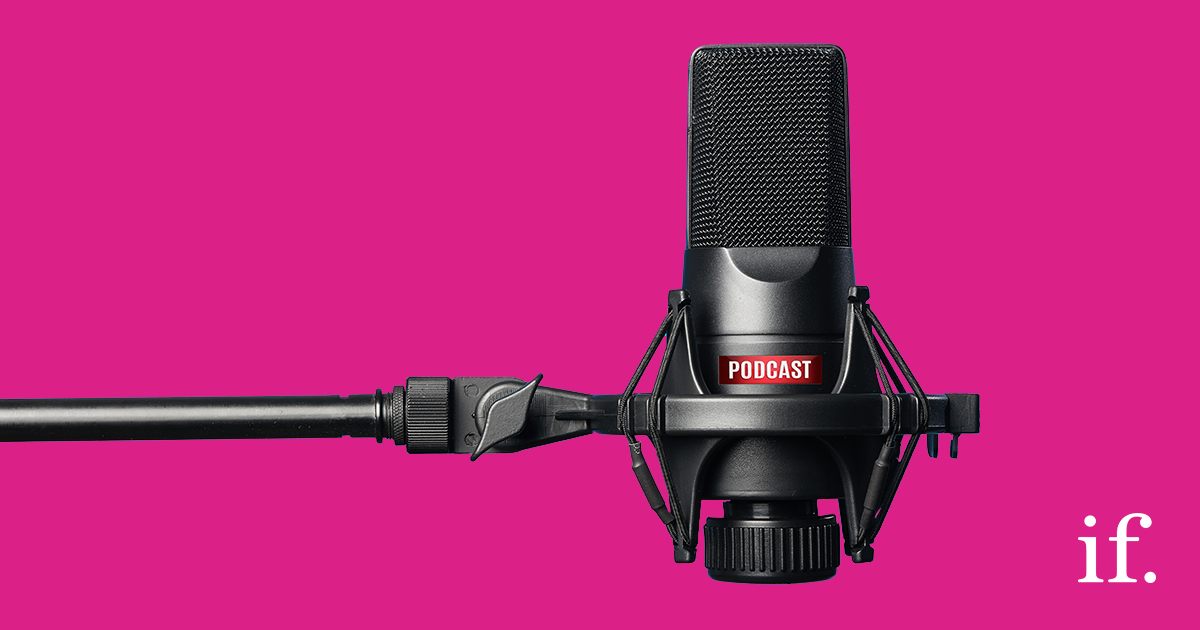Ep 66: Serious Social – Trust the process
In this episode of Serious Social, designers Ollie Farnden and Chantal El Bikai discuss the importance of ‘trusting the process’. Tune in to find out what it is and how not trusting it will lead to erroneous results.
If you’re after more know-how to break the social boring, subscribe now.
Full Transcript
Ollie – Hello, and welcome to this week’s Serious Social live. Today we’ll be discussing the topic of trusting the process and what that means for designers, social media, and social media sorry. I’m Ollie Farnden, Digital Designer here at Immediate Future. And I’m honoured to be joined by Chantal our fabulous Senior Designer. Say hello Chantal.
Chantal- Hi.
Ollie – We will be discussing the challenges we face as designers and how we should all learn to trust the process. So let’s kick it off, Chan, so what is the process for you? And I’ll discuss what it means to me.
Chantal – So, I mean, the process is literally how do you get from A to Z and all those little steps in between.
Ollie – It’s how do you do anything in life that requires a series of steps. It’s how do make a cup of tea in the morning. You don’t, you go from boiling water, putting it in into the mug, everything. Everything is a process and you can just trust that you’re doing it right.
Chantal – Absolutely, yeah, yeah.
Ollie – Yeah, I mean, there’s been so many instances of like processes and it’s so important and we’ve gone through, and especially in design, we do so much design work there where we go from doing something and then going through every step to get to the end result.
Chantal – Yeah.
Ollie – And sometimes I’m sure sometimes we forget some of the steps or we just neglect some of the steps and we’re always like, whoa whoa whoa, why does this not look great?
Chanta l- Yeah and I think that’s, also important to realise that in between your steps in between getting from, you know, from the start to the finish, it’s going to look like absolute poop, right. And we need to remember that and realise that we haven’t quite finished and we haven’t got to the end yet.
Ollie – Yes.
Chantal – And it’s important to let other people realise that as well.
Ollie – Yeah, I mean, there’s been so many instances where I’ve called you and gone, why does this not look good? Why I’ve done everything, everything correct. All the way through and you’re like, oh, well you just missed this one step.
Chantal – Yep.
Ollie – And then it’s like, oh yeah, yeah, yeah. And you have,
Chantal – Yeah.
Ollie – it’s about like trusting yourself to know that you’re doing correctly but.
Chantal – Yeah.
Ollie – There’s, you shouldn’t be berated for missing a step.
Chantal – No.
Ollie – Because mistakes is all part of it.
Chantal – Yeah and it’s also trusting that you can take a step back.
Ollie – Yes.
Chantal – And, you know, maybe let another, a new pair of eyes look at something cause you may have missed something along the way, like you said earlier. So it’s good to have that collaboration and say, “Hey, could you just look over this for me and see, cause it’s not quite vibing for me yet.”
Ollie – Exactly and that is in it in itself part of it, part of a design process, part of a, and again, it doesn’t have to be always part of design. It could be like, if you’re writing a post for social to having someone overlook it and go, oh yeah, great. Or you should do this or make amends. That’s part of the process of making a social post. Right? And.
Chantal – It’s life.
Ollie – Yeah it is life. Like trusting the process you need to trust everything that you do and have faith in yourself, like you don’t want to make, go start to make a cup of tea and go, oh, I forgot to boil the water, I can’t do it. And you’re faltering at the first hurdle. Like that’s not trusting the process. That’s just not…
Chantal – That’s hindering yourself,
Ollie – Hindering yourself and that is the main thing. And you have to have gifts of patience and everything, just to understand that you’re doing it right. You’re doing that is the process of getting something done.
Chantal – Sure, yeah.
Ollie – So yeah.
Chantal – Patience and the ability to give, like allow yourself to have mistakes as well.
Ollie – Exactly.
Chantal – Cause that’s how you learn.
Ollie – Yeah.
Chantal – That’s how you learn your process.
Ollie – And from learning, it makes the process easier.
Chantal – Yeah.
Ollie – So like going back to the tea example, you learned that the kettle needs to be two minutes before making the cup of tea. You don’t want to stand there and wait for the kettle to boil. It’s all about experience and learning. And once you get the experience, your process becomes easier. And that is why you have seniority’s businesses because they have that experience.
Chantal – Yeah.
Ollie – Yeah, so this all… I think this whole conversation about the, we obviously we’ve spoken about doing everything in steps, making sure that you do it right. But I think this whole coming to light in my brain anyway, came from that Royal blood video that I showed you.
Chantal – Yeah, it was a really good video.
Ollie – Yeah, I’ll put, let’s just share it now. So it’s a really interesting video, obviously done in the pandemic and it’s just this one, one character walking through and it changes the background. And I thought it was really, really creative. And I was like, oh, this is really great and this is a really good inspiration for us. Cause it’s low budget, but it didn’t fully click about how this was done until the behind the scenes,
Chantal – Yeah.
Ollie – which is incredible to me.
Chantal – Yeah. Yeah, the fact that like, when you showed this to me, I was like, oh, this is really great. Like whatever, blah, blah, blah. And then when you showed me the behind the scenes and I realised that this was all done at home, obviously during the pandemic that it really like hits it. Like it hits you how low budget it is.
Ollie – Right.
Chantal – In terms of this isn’t a studio, this is just like one guy doing everything.
Ollie – What, just, it blows my mind is that you see this kind of footage and you go the realisation of like the fully, fully realisation of like how it’s going to end up has to be in your brain from the beginning. Like you have to set up these things to get to the end result and then you have to go through all the steps necessary to make it look in it’s final product.
Chantal – Yeah, yeah
Ollie – Again going back to trust and faith.
Chanta l- Yeah, yeah, and like also, I mean, you and I would probably do this really differently.
Ollie – Yeah.
Chantal – And when we saw this, we were both like, oh, so that’s how he did it.
Ollie – Yeah exactly.
Chantal – And I guess that’s his experience and you know, but also the, his own process, like our process would be totally different to this, but it would probably be the same result, you know, in a way.
Ollie – It just, it blew my mind. It kind of just, I was just like, oh, like there’s such, so there’s an actual process that you have to do and it’s processed and everything. It was crazy to me.
Chantal – Yeah.
Ollie – So luckily we were able to ask some of our more client-facing colleagues about the process in terms of how it relates to clients. So the first question I asked was, if there were any instances of pushback on the start of the campaign, and if there are any fears or something that working out straight away. So the first response we got was, realistically trusting the process is pretty internal. I may have some early designs and I think that looks off, but I will always trust that next situation will look better, and it’s true. It’s about trusting that something if it doesn’t look right, you don’t want to show something that’s half baked. You don’t go through two steps and go, okay, have a look at this because that should be considered as a mock-up, it shouldn’t be considered as the final product. And it’s about getting through those steps to the end result, and then looking at the end result as the final piece and then going, oh, let’s judge it on that. Instead of it, looking at it at stage three.
Chantal – I will say though, I think it is quite good to share your process with clients and stuff like that, but they have to understand this isn’t the final product.
Ollie – Yeah, it’s but that, again is part of the process it’s a part of showing every at point, that you think it’s necessary, but it should never be looked at as a final product as a thing. And that links to social media about how we go into expecting instant results. We go in and we start making posts. We start putting yourself out there straight away. And the start of campaign or even start of a new social profile and expecting the results to come in instantly because that doesn’t, it doesn’t work. There’s a process in which to build an audience. And there’s a process in which to get the messaging, the visuals all looking correct, and I just think.
Chantal – I think you’d be very lucky if you went viral overnight without any kind of social media presence.
Ollie – I mean, exactly.
Chantal – I mean, it happens, but very rarely.
Ollie – Yeah, it takes time, it takes time. It takes effort to get into,
Chantal – Patience
Ollie – Patience as well, just to make sure that you, every, every post that you do, every bit of copy that you do is on brand or saying what you want it to do. And you have to build up on the last post. You have to keep on going, keep on plugging and then yeah. That’s how you get to that building and trusting process in that way.
Chantal – Yeah.
Ollie – But yeah. So another question we asked were, is there instances where there was a lack of trust in what we were being produced. So it’s all about saying about, we should trust that we’re doing is correct and getting to the end result, so that the response we got, that there was lots of times that the client was initially wary, but they do trust us to advise them and push content forward and work how, how it works in social media and we’re the experts and that links to the experts in everything. So you could be a social post copywriter. And if you write one sentence and then you go, Hey, or you put that out. Is this not, it’s not trusting the process. You need to make sure that you go through every of the steps.
Chantal – And your steps could be chaotic. But they make sense to you. And it’s still, again, we’re saying this a lot, but it is a process.
Ollie – Yeah, it’s just, when we, yeah, and when we say trust the process, it’s mostly having faith in yourself that.
Chantal – Yeah.
Ollie – And you shouldn’t get to one hurdle, like you reach a block in your brain about how to write the next sentence. You should be, take a step back trust that you know, what you’re doing is right. Trust that you’ve done all the steps appropriately up and to that point then move forward.
Chantal – Yeah and don’t be afraid to ask for little help if you need it.
Ollie – Yeah.
Chantal – There’s no shame in that.
Ollie – Exactly. No, no shame in asking for help, no shame in mistakes. Cause you always learn from that, like you said before.
Chantal – Yeah.
Olie – And so finally we asked, if they were trusting the process is crucial to creating brand recognition and if clients should not expect instant results. So that’s what we said before. So whatever the campaign, so with the first result is whatever the campaign it’s important not expect results straight away, there’s lots of going into social, so patience and trust are key. So reiterating what we’ve said it’s just about taking a deep breath, taking these necessary steps to get to the end result, and trusting that you’ve done that all correct. And it links to everything. And lastly, we had the response of saying that it’s especially true when in early, when early designs come through and it’s just a mess of concept in colours, or they’re just an animation reference to competitors that have done something cool and we can feel like we can iterate and improve. It’s hard to see the end product at this stage and recognise its benefits of all the work that’s going into building the brand recognition that admits the creative process, but we need to trust the process and trust that designers are ultimately delivering eye-catching and interesting results. And that’s true.
Chantal – Yeah.
Ollie – It’s all about like, it’s like when we start off doing an animation, we don’t look at stage three of the steps that we need to take and go, this is the stage one, because then it’s working backward and that could be your process, I’m not saying that’s bad process, but trust that what you’re doing is correct, basically.
Chantal – Yeah, yeah.
Ollie – Like, and having the vision and having the faith that the end result will be what you want it to be.
Chantal – Yeah and even if it isn’t, it’s still something and you’ve still learned from that experience.
Ollie – Yeah.
Chantal – And that process that you can then apply to your other things, you know.
Ollie – Yeah exactly.
Chantal – It’s all about learning and just go for it.
Ollie – Go for it, definitely. And if we’d just bring it back to social media, just if you’re a brand and you go and you post something straight away and you go, okay, let’s look at the results for this. But the first post is going to get, it’s obviously going to get some results, but you need some build upon that. It’s like trust, trust the process.
Chantal – Trust the process, yeah.
Ollie – Trust that the next post will iterate on that. And the next post will improve on that. And that you build it up. These are the steps to build up a social presence. The steps to building up the campaign. You can’t go straight in and expecting results. And as you said, unless it’s extraordinarily rare for that to happen.
Chantal – Yeah, yeah.
Ollie – And to think, I just think everything needs faith, everything needs to trust.
Chantal – Patience and trust and a little bit of fairy dust.
Ollie – A little bit of fairy dust, doesn’t help, I mean, does help, sorry. It doesn’t help, but that’d be bad, right? Does help and making sure that it makes sense. And yeah.
Chantal – Yeah.
Ollie – It’s just, it’s, this realisation really just came to me after watching that video, we shared, that everything, everything requires you to do step by step.
Chantal – Yeah.
Ollie – Have the vision, have the faith that the end result is going to look the way you want it to look.
Chantal – Yeah.
Ollie – The way you want it to read, the way you want it to everything that you do, that the way you want it to taste, cooking is a perfect example of trusting the process. You can’t go halfway through the cooking stage and falter at the first hurdle because you couldn’t, couldn’t do something, right?
Chantal – Yeah, yeah.
Ollie – Everything, then yeah, we’re just, it’s really iterating that processes on social media, it’s the same as anywhere. Trust, do the steps, get it right. Get it right, first, it doesn’t have to be first time. You can take a step back, but trust that is part of it and that you can always improve.
Chantal – Yeah and you’re learning from that.
Ollie – Right, yeah. I mean, you’ve had many instances with your own work where you have to trust the process, right.
Chantal – Yes, oh my goodness. Yeah, there’s times where I’m like, okay, this idea of mine is still cooking in my brain. I don’t quite have the skills for it yet, but you know, give me just a few more other things and I’ll get there, but it’s like that with everything, you know, you just have to trust in yourself. And again, trust the process.
Ollie – People are going to be tired of us saying trust the process.
Chantal – I know.
Ollie – Sorry, we’re gonna have to get a counter-up.
Chantal – It is what it is.
Ollie – It is what it is. But I think we’ve kind of reached the closing point. Cause I think we both agree. Trusting the process is important on social media, in design, anything you do is all about making sure that you take the steps. So I think that’s all from us. So remember that you will find this edited video in your feed soon, along with the podcast from wherever you get your podcasts from. And finally, we’ll be taking a little break from Serious Social Live this month, but we’ll be back bright-eyed and bushy-tailed next month. For now, goodbye and have a great rest of your Friday.




